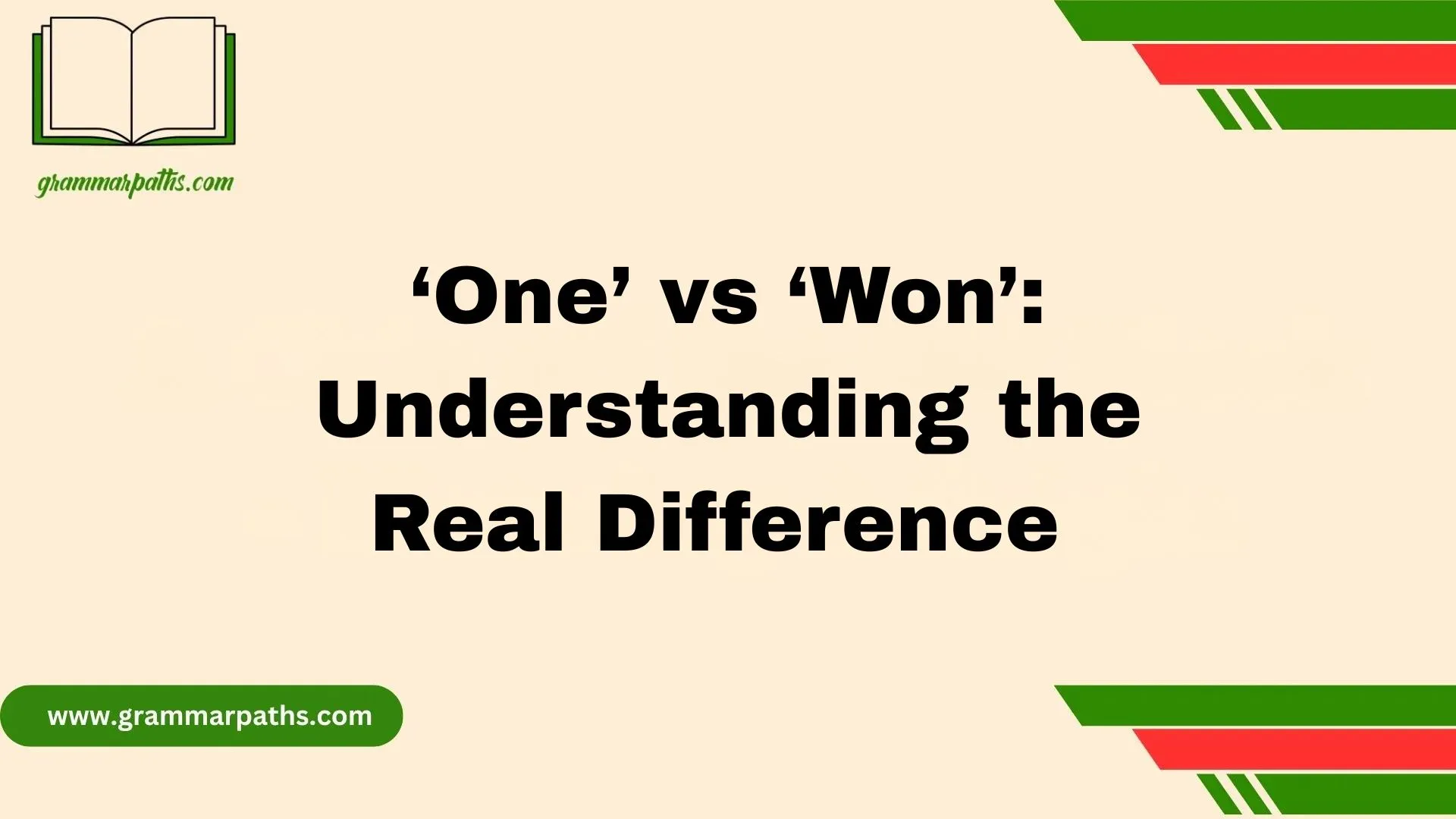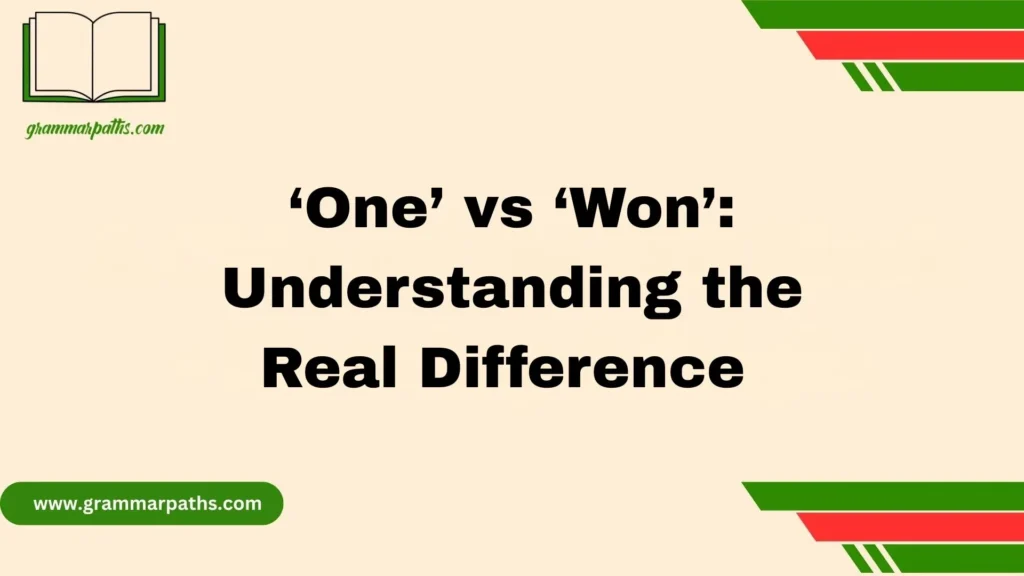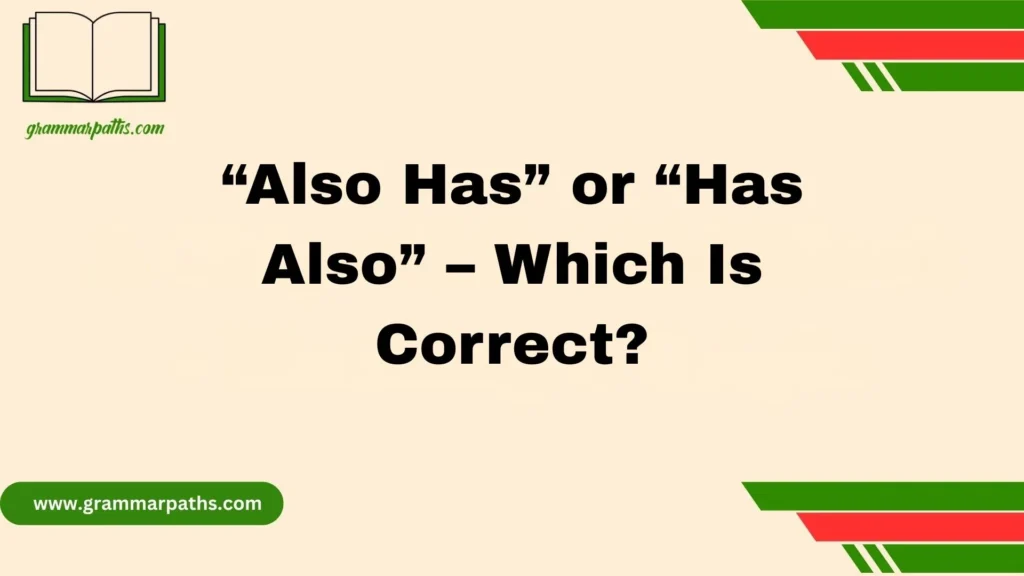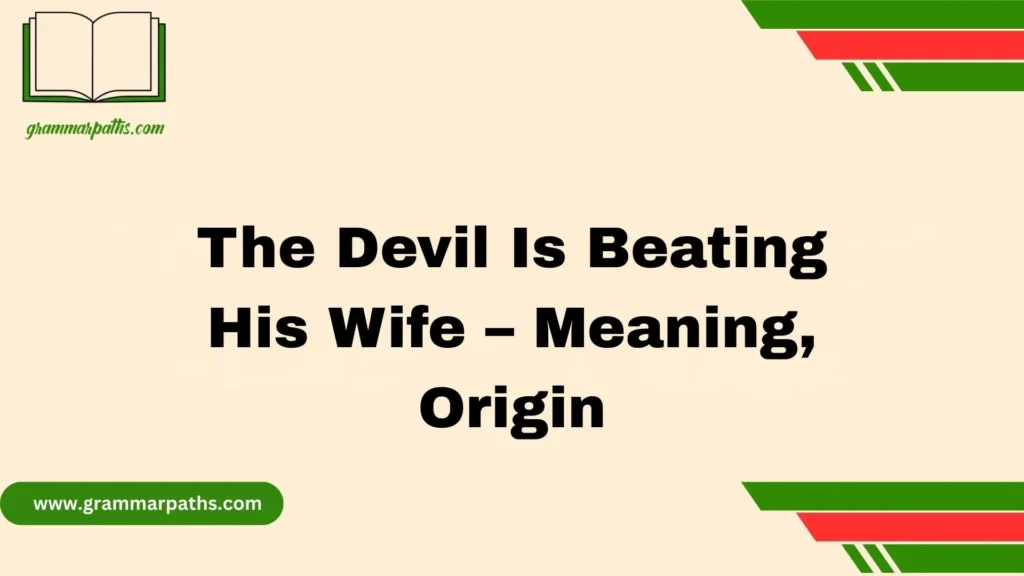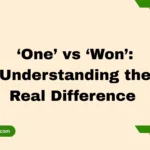The confusion between “U‘One’” and “Won” is more common than you might think. Both words sound identical when spoken, but their meanings and spellings are completely different. This makes them homophones — words that share pronunciation but differ in meaning and usage. Understanding the distinction between “One” and “Won” can help improve your English grammar, spelling, and communication clarity.
The word “One” refers to the number 1, often used to identify a single person, object, or idea. For example, “I have one apple” or “She’s the one who called.” Meanwhile, “Won” is the past tense of “win,” describing a victory or achievement. For instance, “He won the game yesterday.” Although the two words sound the same, their context and meaning reveal their true identity.
In writing, mixing up “One” and “Won” can lead to misunderstandings or grammatical errors. Recognizing the difference is key to mastering English vocabulary and homophone usage. This article will explore their definitions, examples, and common mistakes, helping you remember when to use “One” versus “Won.”
The Homophone Dilemma: Why ‘One’ and ‘Won’ Sound the Same
Both “one” and “won” are homophones, meaning they sound identical but differ in spelling and meaning. In American English, both are pronounced /wʌn/—which sounds like “wuhn.”
Phonetic Breakdown
- One → /wʌn/
- Won → /wʌn/
Even though the vowel sounds and pronunciation are identical, their meanings couldn’t be more different. This similarity stems from how English evolved over centuries, absorbing influences from Old English, Norse, and French.
Comparison Table: One vs Won
| Word | Part of Speech | Pronunciation | Core Meaning | Example Sentence |
| One | Number / Pronoun / Adjective | /wʌn/ | Refers to a single item, unit, or person | “One apple remains on the table.” |
| Won | Verb (past tense of win) | /wʌn/ | Describes achieving victory or success | “She won the marathon.” |
Key takeaway: The only way to distinguish between “one” and “won” is through context, not pronunciation.
‘One’: More Than Just a Number
The word “one” might look simple, but its role in English is surprisingly versatile. It can function as a number, pronoun, adjective, or even part of an idiom.
As a Number
When used as a number, “one” simply indicates a single unit or quantity.
Examples:
- “There’s only one seat left.”
- “She has one goal—to succeed.”
As a Pronoun
“One” is often used to refer to a person in general, similar to how “you” is used in everyday speech.
Examples:
- “One should always tell the truth.”
- “It’s difficult for one to make such a choice.”
In this form, “one” carries a sense of formality, often used in academic or professional writing.
As an Adjective
“One” can describe unity or singularity.
Examples:
- “They moved as one team.”
- “He is the one man I trust.”
Idioms and Expressions Using ‘One’
| Phrase | Meaning | Example |
| One of a kind | Unique, rare | “That painting is one of a kind.” |
| One and only | The sole or special person | “You’re my one and only.” |
| At one with | In harmony with | “She feels at one with nature.” |
| All in one | Combined together | “This gadget is an all-in-one solution.” |
These idioms show how flexible and expressive “one” can be in everyday English.
‘Won’: The Past Tense of ‘Win’
The word “won” is the past tense and past participle of the verb “win.” It describes achieving victory, success, or accomplishment.
Forms of the Verb “Win”
| Verb Form | Example |
| Present: win | “They win every year.” |
| Past: won | “They won last night.” |
| Past Participle: won | “They’ve won three trophies so far.” |
Examples of ‘Won’ in Context
- “The team won the championship.”
- “She won a scholarship to Stanford.”
- “He won her respect through hard work.”
Common Phrases and Idioms with ‘Won’
| Phrase | Meaning | Example |
| Hard-won | Earned through effort | “It was a hard-won victory.” |
| Well-won | Rightfully earned | “Their success was well-won.” |
| No one won | Nobody succeeded | “In that argument, no one won.” |
Quick Fact: In sports and competitions, “won” is almost always used to describe results or achievements—making it a favorite in journalism, commentary, and news reporting.
The History and Etymology Behind ‘One’ and ‘Won’
Understanding their roots helps explain why “one” and “won” sound alike but differ in meaning.
Origin of ‘One’
- Derived from Old English “ān,” meaning single, individual, or alone.
- Related to the German “ein” and Latin “unus.”
- Over time, pronunciation shifted due to vowel changes in Middle English, but the spelling stayed.
Origin of ‘Won’
- Comes from Old English “winnan,” meaning to fight, struggle, or contend.
- In medieval English, “wonne” referred to a person who overcame hardship.
- The modern verb “win” emerged around the 13th century, evolving into “won” as the past tense.
Linguistic Note
Both words were affected by the Great Vowel Shift (a major pronunciation change between 1400–1700), which made their vowel sounds merge into /wʌn/. This explains why they sound identical today.
Grammar and Usage: When to Use ‘One’ and When to Use ‘Won’
The easiest way to avoid confusion is by asking yourself one simple question:
Am I talking about counting or achieving?
- If you’re counting → Use “one.”
- If you’re describing victory → Use “won.”
Examples
| Incorrect Sentence | Correct Sentence | Explanation |
| She one the prize. | She won the prize. | Describes victory. |
| I have won apple. | I have one apple. | Refers to quantity. |
| He has one the match. | He has won the match. | Describes winning. |
| She gave me won chance. | She gave me one chance. | Describes quantity. |
Quick Tip
If your sentence can be replaced with “achieved” or “succeeded,” use “won.”
If it involves numbers, identity, or singularity, use “one.”
Common Mistakes and How to Avoid Them
Confusing “one” and “won” happens often, especially in writing where context is limited. Let’s look at why:
Why Confusion Happens
- Both sound identical when spoken aloud.
- Autocorrect may not catch the error since both are valid words.
- Non-native speakers rely on sound rather than context.
Memory Tricks to Remember
- Think of “win → won.” If there’s no competition, it’s probably “one.”
- The word “won” contains the same letters as “own.” You can’t “own” a win unless you’ve “won.”
- Visualize: One has the letter “O” for only one thing.
Common Error Examples
| Wrong | Right |
| He one the lottery. | He won the lottery. |
| I have won dog. | I have one dog. |
| She has one the gold medal. | She has won the gold medal. |
Context Clues: How to Tell Which Word Fits
When pronunciation fails, context saves the day. Look at the surrounding words—verbs, nouns, and objects usually reveal which one makes sense.
Example 1:
“John ___ the race.”
→ Race = competition → won.
Example 2:
“Only ___ person showed up.”
→ Person = countable noun → one.
Example 3:
“She’s the ___ who helped me.”
→ Descriptive pronoun → one.
Tip: Always check the verb tense. If the sentence describes something achieved or completed, “won” fits naturally.
Real-World Applications and Examples
In Academic Writing
Students often misuse “won” and “one” in essays or reports.
Example: “One could argue that perseverance leads to success.”
Here, “one” represents an unspecified person, making the sentence formal and clear.
In Professional Communication
Emails and reports require precision.
Example: “Our team won the client proposal.”
Using “one” instead of “won” here would completely alter the meaning.
In Journalism and Media
News headlines frequently use “won.”
Example: “Boston won the playoff series in five games.”
Clarity matters, especially in headlines where every word counts.
Case Study: A Student Essay Slip-Up
A college student once submitted an essay stating, “She one the competition.”
The professor marked it wrong—not because of bad grammar, but because of word misuse. A single misplaced word changed the intended meaning.
Moral of the story: in academic or professional writing, a tiny word choice can shift your entire message.
Quick Reference Guide: Summary Table
| Usage Type | Correct Word | Example |
| Number or Quantity | One | “There is only one seat left.” |
| Pronoun (referring to a person) | One | “One must learn from mistakes.” |
| Past tense of ‘win’ | Won | “They won the trophy yesterday.” |
| Past participle form | Won | “He has won multiple awards.” |
| Describing unity or identity | One | “We are one team.” |
Tips to Master the Difference
- Use association:
Link “won” with “win.” You can’t win without having won first.- Practice writing sentences:
Create mini-exercises for yourself. Replace “one” and “won” in similar sentences to spot the difference.- Read more English content:
The more you read—especially news, essays, and books—the faster your brain recognizes patterns of correct usage.- Proofread carefully:
Don’t rely on autocorrect. Read aloud; your ear will often catch what your eyes miss.- Use online tools:
- Grammarly
- Merriam-Webster Dictionary
- Cambridge Dictionary
These tools provide accurate definitions and examples.
Conclusion
The distinction between “One” and “Won” lies in their meaning and usage, not their sound. While both words are homophones, “One” represents a number or singular identity, and “Won” signifies success or victory. Paying attention to context can help you determine which form is correct. Remember, “One” = number (1) and “Won” = past tense of win. Knowing this small difference can make a big impact on your writing accuracy and spoken communication.
Mastering homophones like “One” and “Won” strengthens your grammar skills, boosts clarity, and helps you communicate more confidently in English.
FAQs
Q1: Are “One” and “Won” pronounced the same?
Yes, both words are pronounced the same way — making them homophones in English.
Q2: What does “One” mean?
“One” is a number that represents a single unit or person. Example: “I have one pen.”
Q3: What does “Won” mean?
“Won” is the past tense of “win.” Example: “She won the race yesterday.”
Q4: How can I remember the difference between “One” and “Won”?
Think of “One” as a number and “Won” as a victory — “You won because you were the one who tried.”
Q5: Can “Won” ever be used as a noun?
No. “Won” is always a verb (past tense of “win”), while “One” can be a noun, pronoun, or adjective depending on the sentence.

Mia Rose is the passionate writer and founder of GrammarPaths.com, a resource dedicated to helping learners master English grammar, idioms, and writing skills with ease. With a deep love for language and years of experience in teaching and content creation, Mia simplifies complex grammar rules into clear, practical guides that readers can instantly apply.
